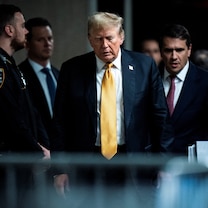Senate Judiciary Committee questions legality of Major League Baseball's antitrust exemption
The Senate Judiciary Committee is questioning the legality of Major League Baseball's antitrust exemption, releasing a letter on Tuesday addressed to Advocates for Minor Leaguers asking about its effect on the lives of players.
The letter is a bipartisan effort led by Senators Dick Durbin (D-Illinois), Chuck Grassley (R-Iowa), Richard Blumenthal (D-Connecticut) and Mike Lee (R-Utah). The letter by the Judiciary Committee marks the first substantial step taken by the federal government to question the legality of MLB's antitrust exemption.
"We write to seek information about how baseball's antitrust exemption is impacting competition in the labor market for minor league ballplayers as well as the operations of minor league teams," the letter reads.
The questions from the letter include: what effect the antitrust exemption has on the occurrence of lockouts and work stoppages at the MLB level; what role the antitrust exemption plays in requiring all minor leaguers to sign a uniform player contract; and what effect removing the antitrust exemption would have on minor league working conditions. It also asks about the extent of corruption and abuse on the market for international prospects and if the antitrust exemption has any role in enabling these signing practices.
The letter represents the most thorough questioning of MLB's antitrust exemption at the federal level. The issue had twice reached the Supreme Court since 1922 (1953 and 1972), and a 2017 challenge failed in the 9th U.S. Circuit Court of Appeals.
"We need to examine how Major League Baseball's 100-year-old antitrust exemption is affecting the operation of minor league baseball teams and the ability of minor league ballplayers to make a decent living," Durbin wrote. "This bipartisan request for information will help inform the Committee about the impact of this exemption, especially when it comes to minor league and international prospects. We need to make sure that all professional ballplayers get to play on a fair and level field."
Wrote Grassley: "This is about ensuring a level playing for the minor leagues and its players. MLB's special antitrust exemption shouldn't be imposing labor or contraction problems for minor league teams and players. Baseball is America's pastime and that means more than just the major leagues."
Outlawing MLB's antitrust exemption would fundamentally alter the business of baseball in America.
The uniform player contract signed by every minor leaguer states that teams control the rights of players for up to seven years in the minor leagues and seven years in the major leagues. Due to the antitrust exemption, if a minor leaguer decides to stop playing the sport before the seven years in the minors or the majors, the team owns the rights to the player and he cannot play the sport professionally elsewhere unless he is released from his contract.
"Minor league players are far and away the group most negatively impacted by baseball's antitrust exemption," Advocates for Minor Leaguers director Harry Marino said. "MLB owners should not have a special license to underpay their workers. We are confident that Congress will recognize as much through this process and, ultimately, repeal baseball's antitrust exemption as it relates to issues concerning minor league players."
Of the four major sports in America, baseball is the only one that possesses an antitrust exemption. MLB has operated with an antitrust exemption since 1922 after the Supreme Court decided that the league could suppress wages and make business decisions operating outside of anti-monopoly rules.
As a result of the antitrust exemption, baseball players who sign the uniform player contract cannot seek better pay elsewhere. In 2022, minor leaguers will make an annual salary between $4,800 and $15,400. The U.S. federal poverty guideline for one person in most states in 2022 is $13,590.
Those in the federal government previously threatened MLB's special antitrust exemption. In March 2022, Durbin tweeted that "it's time to reconsider MLB's special antitrust exemption, which allows them to act as a lawful monopoly."
Sen. Lee, a member of the Judiciary Committee, introduced a bill called the Competition in Professional Baseball Act that has the backing of three other Republicans on the panel, including Ted Cruz of Texas, Josh Hawley of Missouri and Marsha Blackburn of Tennessee. When introducing the bill, Lee said that antitrust laws enhance competition and that competition benefits consumers by bringing down price and increasing quality.
"There's no reason that Major League Baseball should be treated any differently than any other professional sports leagues in America," Lee said in April 2021. "No reason why they ought to have preferential treatment relative to the NFL, or the NBA, or any other professional athletic organization."
Additionally, four minor league teams filed a lawsuit to the United States District Court in late December arguing that Major League Baseball's decision to end the big league affiliation of those clubs represented anticompetitive behavior that violated federal antitrust laws, representing collusion on the part of MLB to eliminate the role of the free market in determining the fate of franchises.




